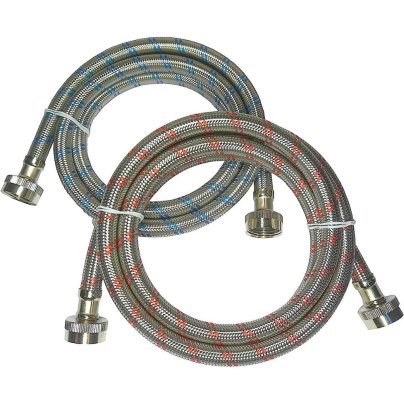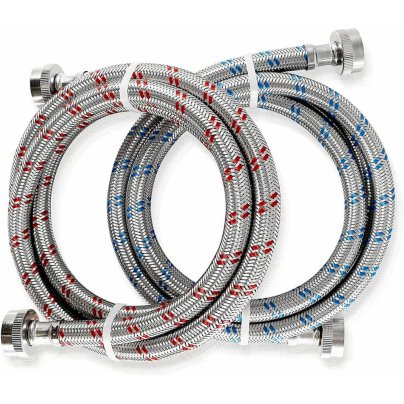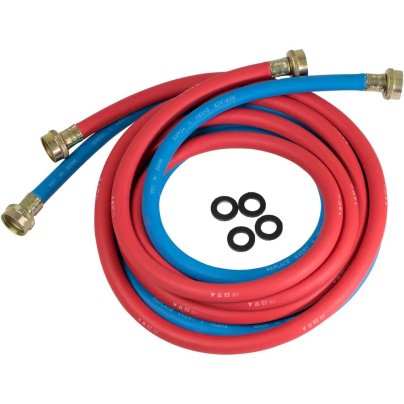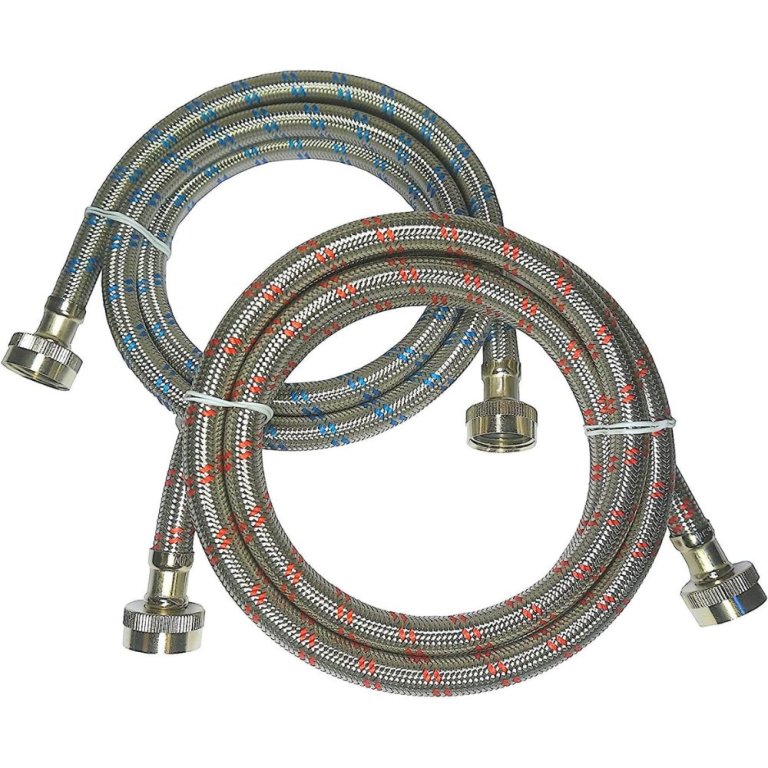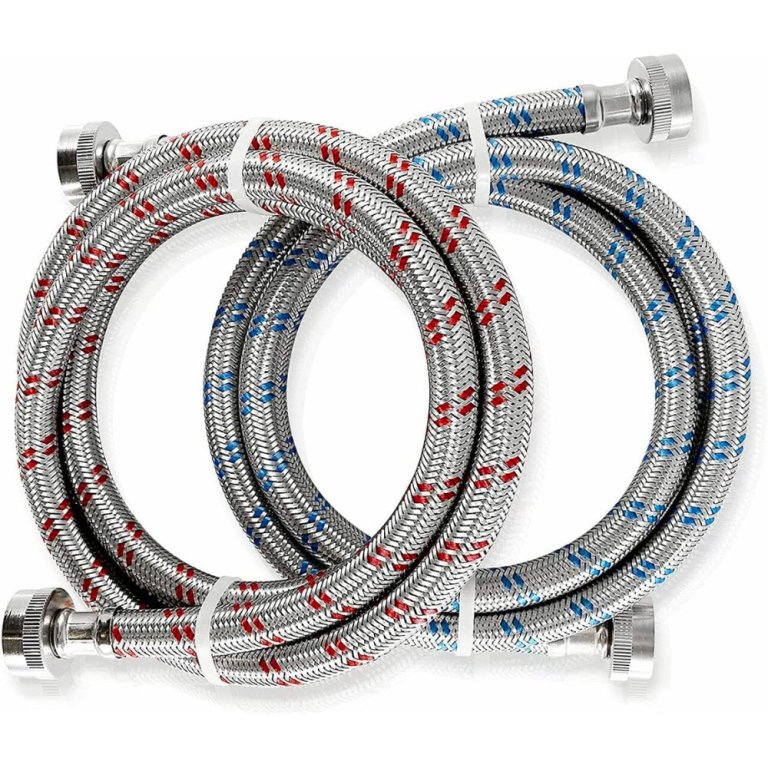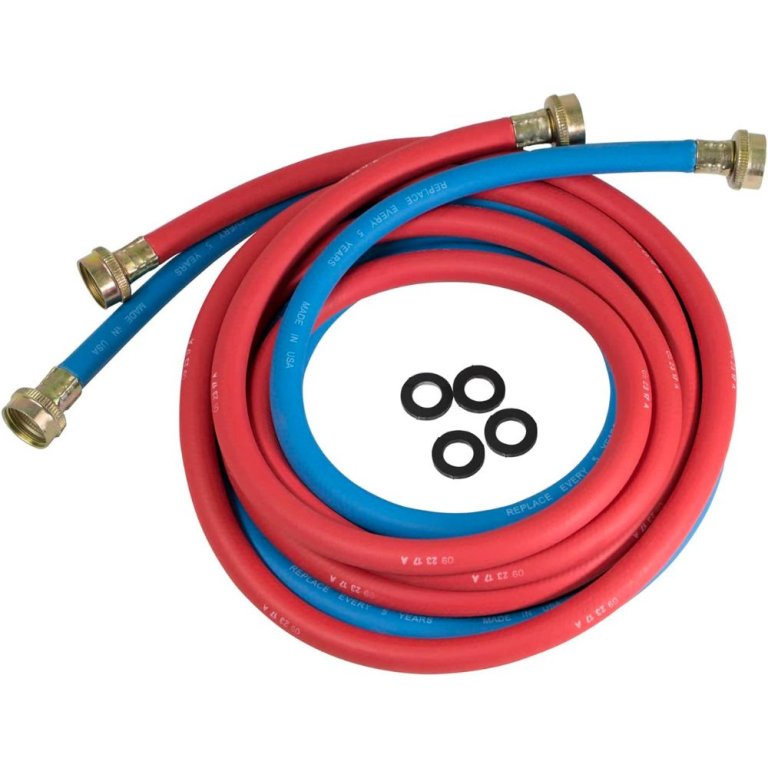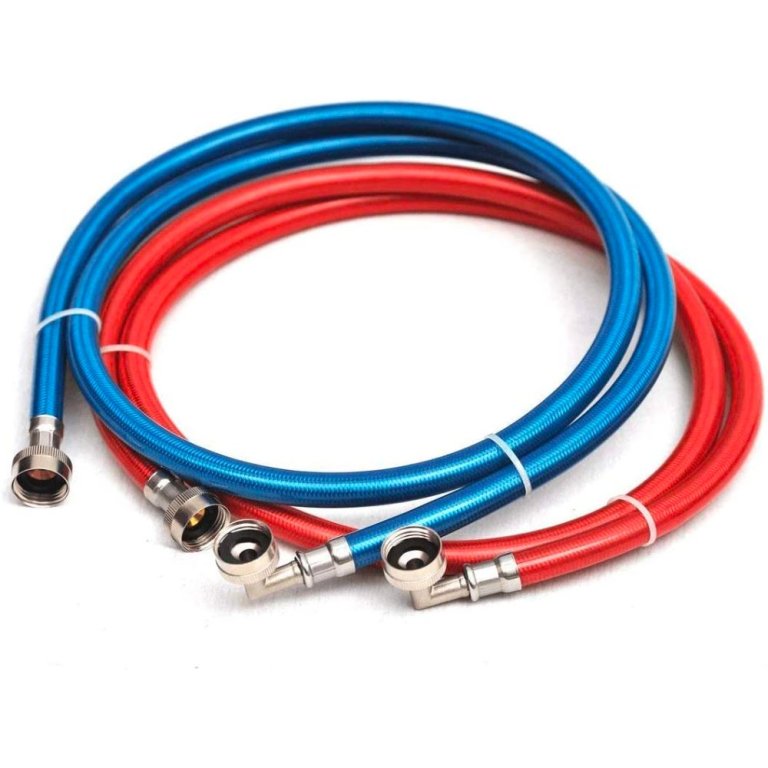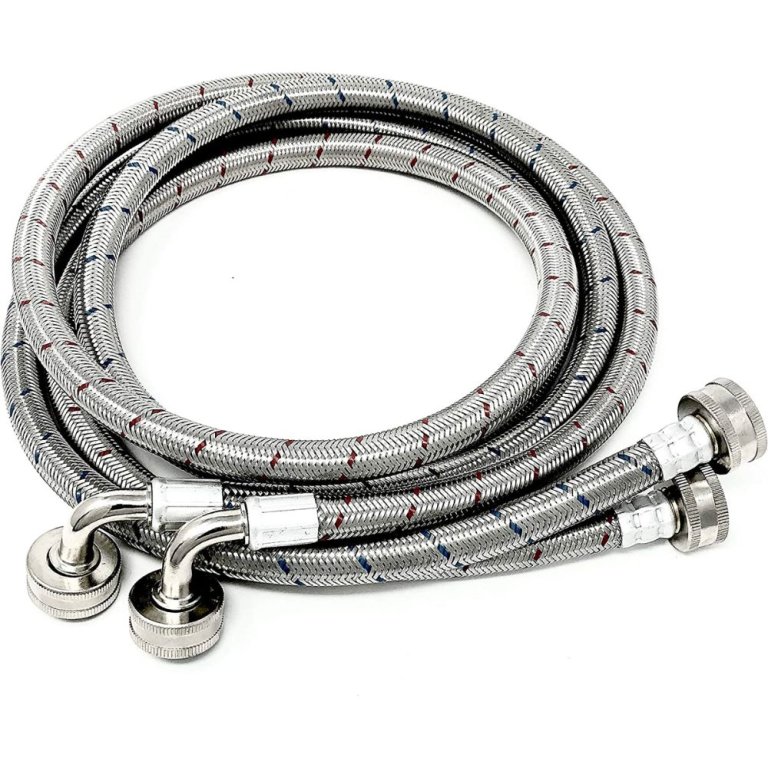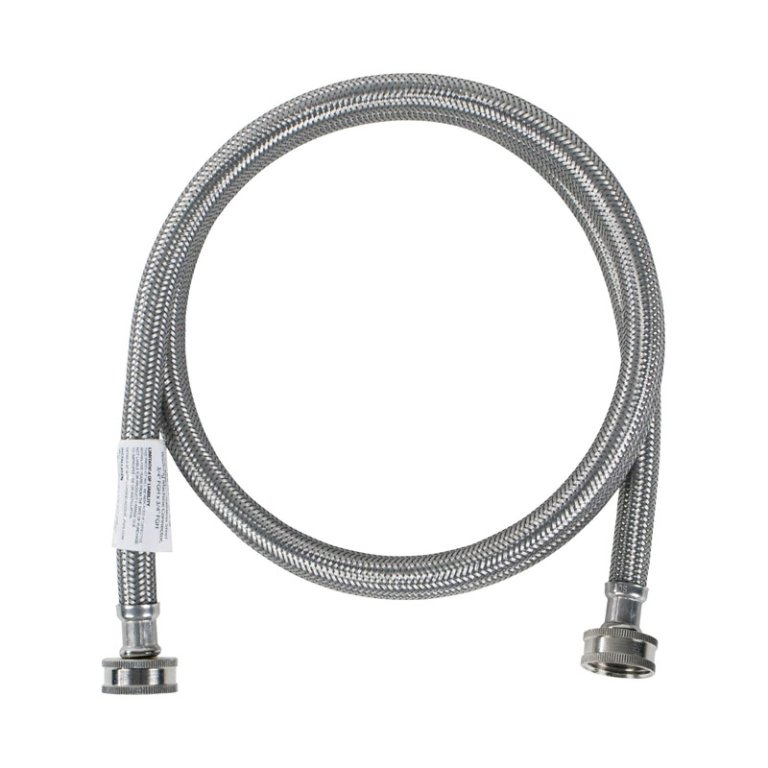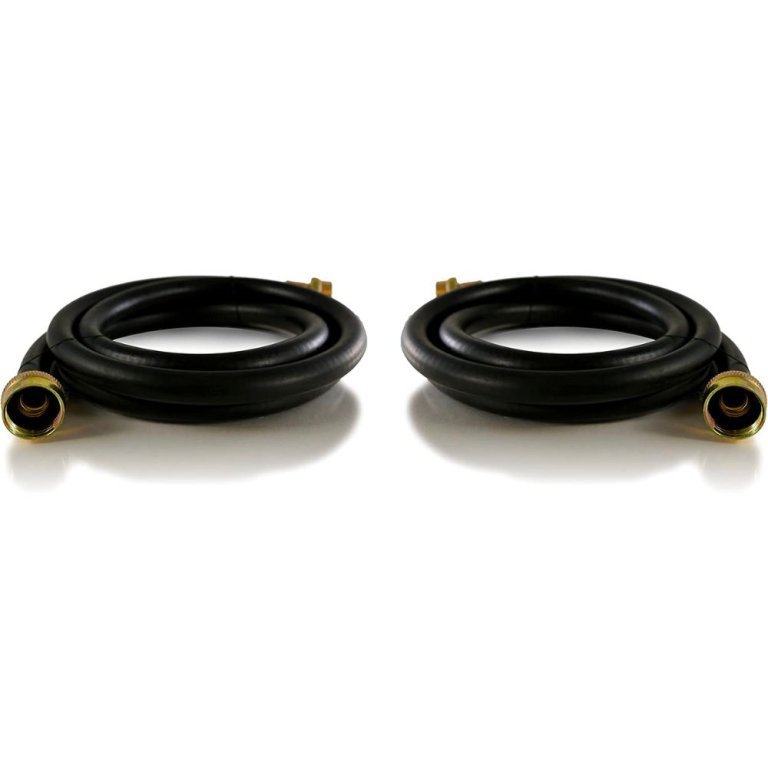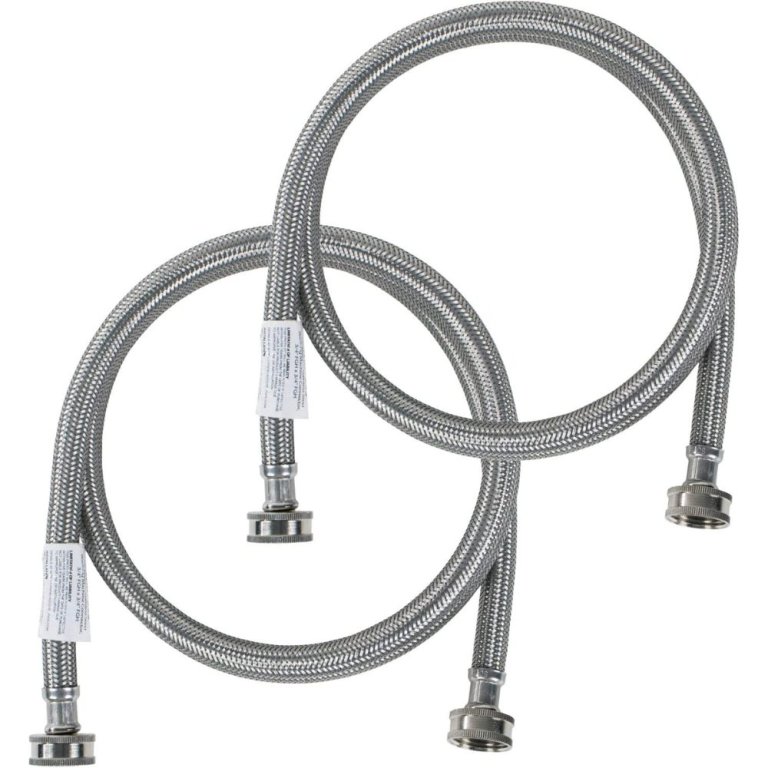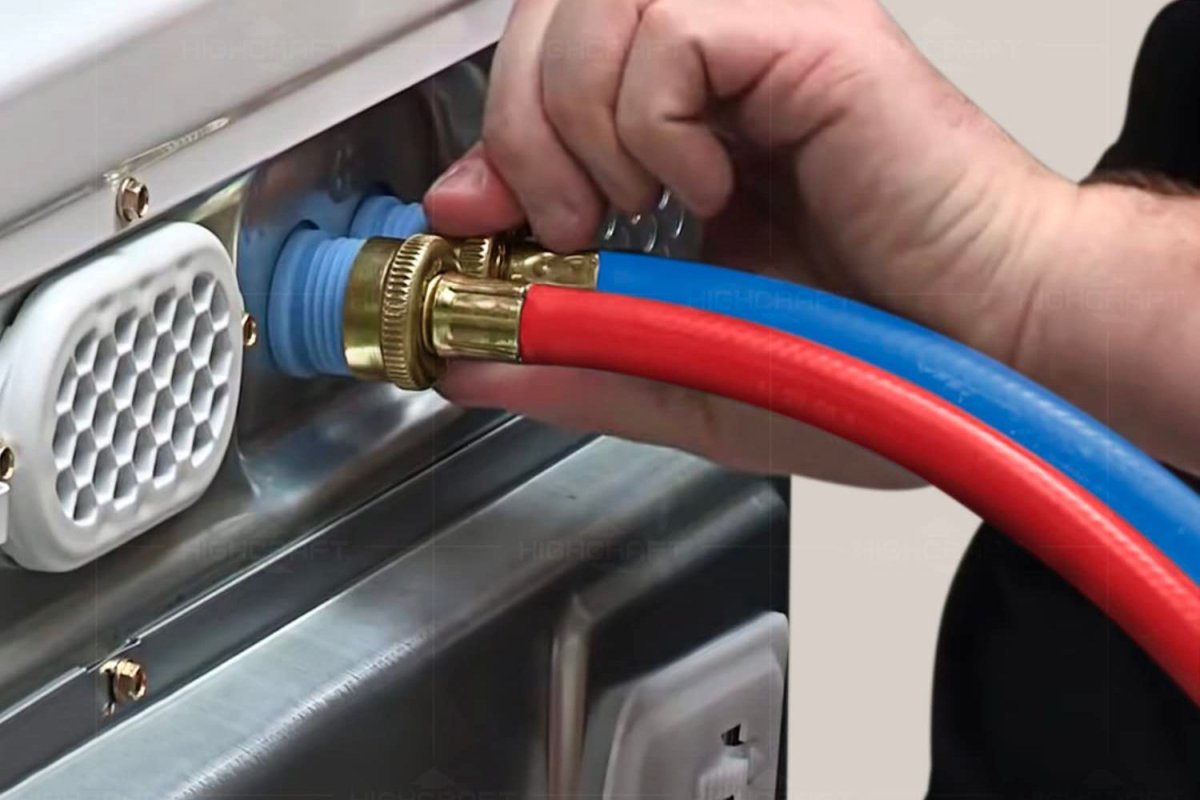
We may earn revenue from the products available on this page and participate in affiliate programs. Learn More ›
Many people treat washing machine hoses as a “fit and forget” item and are unaware that washer hoses are subject to wear. That is, until they are suddenly ankle deep in water and suds. One of the causes of washer hose wear is the constant friction of the water itself. Additionally, frequent changes in water pressure and temperature add to the problem, and cracks and bulges can form in hoses, causing points of weakness.
A good washing machine can last many years, but manufacturers recommend replacing even the best washing machine hoses every 5 years. For anyone who can’t remember when they last checked the condition of their hoses, there’s a good chance they are due for renewal. In this comprehensive guide, we help shoppers find the best replacements for washing machine hoses to prevent accidents in the laundry room.
- BEST OVERALL: Kelaro Stainless Steel Washing Machine Hoses
- RUNNER-UP: K&J Hot and Cold Water Steel Washing Machine Hoses
- BEST BANG FOR THE BUCK: Highcraft Rubber Washing Machine Connector Hoses
- UPGRADE PICK: Hippohose PVC-Coated Steel Washing Machine Hoses
- BEST 90-DEGREE ELBOW: Shark Industrial Premium Steel Washing Machine Hoses
- BEST SINGLE PACK: Certified Appliance Accessories Washing Machine Hose
- HONORABLE MENTION: K&J Premium Burst-Proof Rubber Washing Machine Hoses
- ALSO CONSIDER: Certified Appliance Accessories Washer Hoses (2-Pack)
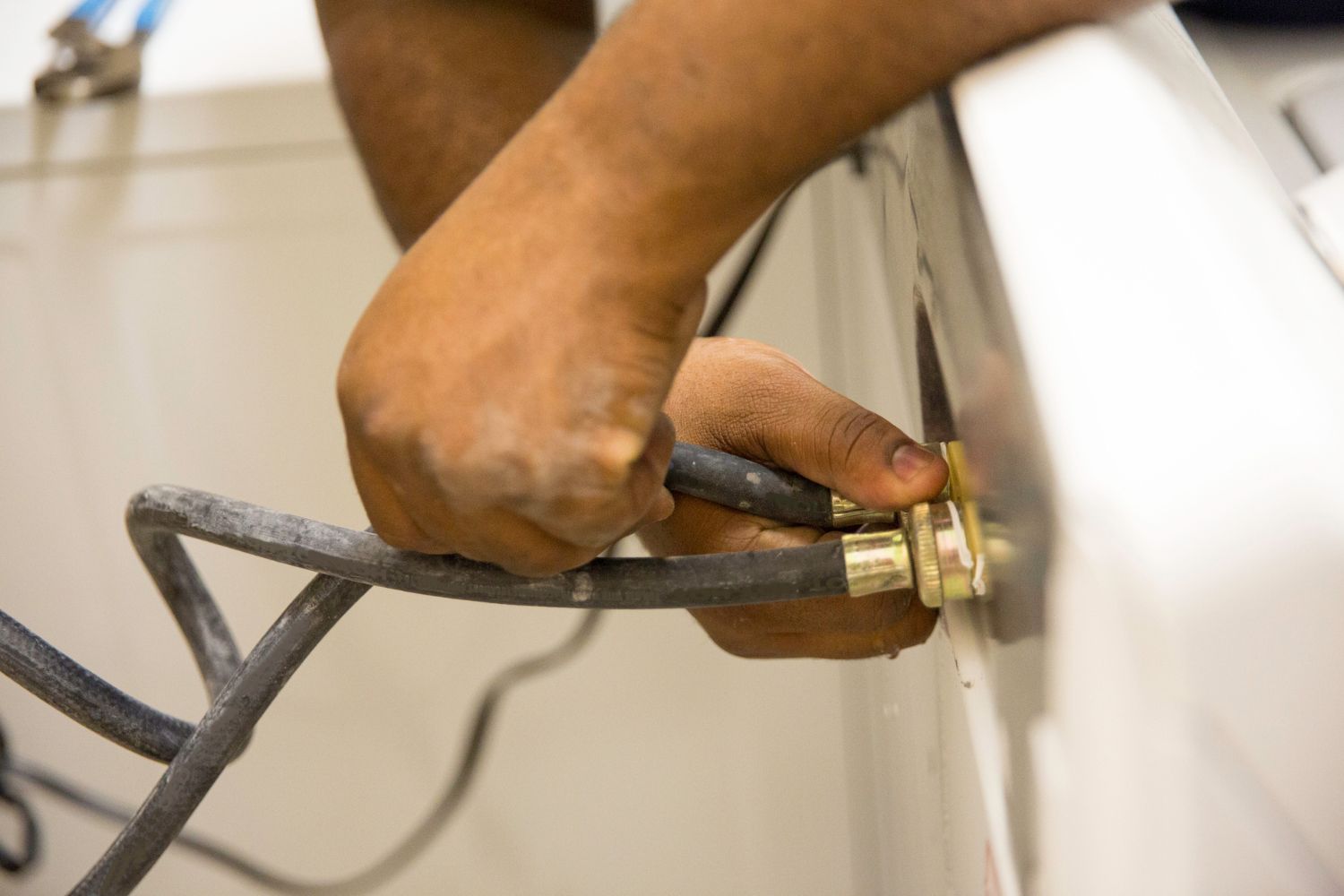
How We Chose the Best Washing Machine Hoses
We researched the most sought-after washing machine hoses for laundry room setups in their respective categories and discovered that the best options are determined by their lengths, materials, ease of installation, and other special features included by top brands.
After extensive product research, we included options in our list of top picks that came in 3- to 12-foot lengths to accommodate any laundry room setup. All of these washing machine hoses are constructed with strong, burst-proof materials such as PVC, UPC, rubber, nickel-plated brass, 304 stainless steel, and regular stainless steel. Plus, we carefully selected washer hoses that were easy to install with universal fasteners that will fit most washing machines.
Our Top Picks
It’s now time to look at washing machine hoses that are currently available to purchase for your laundry room. While there are many similarities, small differences might make one pair more appropriate than another, so they are separated into a number of categories.
Best Overall
Kelaro Stainless Steel Washing Machine Hoses
Pros
- Lead-free and certified to California AB1953 and CSA (Canadian Standards Association) standards
- Burst-proof up to 1,500 psi; excellent durability for long-term use
- Nuts and ferrules are nickel-plated brass with a universal ¾-inch NPT, and the included washers provide a leak-free seal
- Comes in multiple lengths depending upon users’ needs and preferences
Cons
- May not fit some standard attachments; plumber’s tape may be required upon installation
Product Specs
- Length: 3, 4, 6, 8, or 12 feet
- Material: PVC and UPC (Uniform Plumbing Code)-certified 304 stainless steel
- Ease of installation: Easy
Kelaro’s washing machine hoses are made from UPC (Uniform Plumbing Code)-certified 304 stainless steel, a material popular in kitchen and laundry appliances because of its strength and resistance to both heat and corrosion. They are also lead-free and certified to the California AB1953 (safe for drinking water), NSF61 (National Sanitary Foundation), and CSA (Canadian Standards Association) standards.
The washer hose core is PVC, which is burst-proof up to 1,500 psi (pounds per square inch). Comparatively, standard household water pressure is approximately 60 psi. Nuts and ferrules are nickel-plated brass with a universal ¾-inch NPT (National Pipe Thread). The thick washers ensure a leak-free seal. The washer hoses for the hot and cold water are clearly identified by a blue or a red stripe through the braid. Kelaro’s premium washing machine hoses are available in 3-, 4-, 6-, 8- and 12-foot lengths.
Get the Kelaro stainless steel washing machine hoses at Amazon or Kelaro.
Runner-Up
K&J Hot and Cold Water Steel Washing Machine Hoses
Pros
- 1 braid marked red (hot) and 1 blue (cold) to connect to water supply valves
- Extra-thick, leak-free rubber washers better seal at each connection point
- Accommodates ¾-inch NPT; common to all U.S. washing machines
- Pliable rubber washers offer leak-free use for added user-friendliness
Cons
- Some users have reported poor quality construction and leaks after use
Product Specs
- Length: 6 feet (1 hose)
- Material: Rubber and stainless steel
- Ease of installation: Easy
K&J’s 6-foot long, high-tensile hoses are affordable and durable—great for hot and cold water hookups. The core is rubber, which provides excellent flexibility. It’s also tough—the same grade is used for car tires.
These washer hoses are identified with red and blue markings throughout the braid, though their strength and temperature resistance means they are actually interchangeable. Fittings are ¾-inch NPT, common to all U.S. washing machines, with a pliable rubber washer for leak-free connections.
Get the K&J stainless steel washing machine hoses at Amazon.
Best Bang for the Buck
Highcraft Rubber Washing Machine Connector Hoses
Pros
- High heat resistance compared to other washing machine hoses available
- Resists any damaging UV rays in case of outdoor installation
- Washers are pre-fitted and will not fall out; also prevents leaks
- Colored rubber construction clearly identifies which hose is for cold or hot water
Cons
- No replacement washers included; may need to be purchased separately
Product Specs
- Length: 4, 5, 6, 10, and 12 feet
- Material: EPD rubber and nickel-plated brass
- Ease of installation: Easy
For decades, rubber hoses like this quality example from Highcraft were the standard in all households. These American-made hoses are EPD rubber (ethylene propylene diene), a synthetic version that’s technically a saturated polyethylene. It’s favored for its high heat resistance and, unlike some synthetic rubbers, is largely unaffected by the damaging UV rays in daylight. They are reinforced with a spiral polyester mesh.
Fittings are ¾-inch NPT made of nickel-plated brass so they can suit most washing machines. Washers are pre-fitted so they won’t fall out. The rubber is colored for easy identification: blue for cold, red for hot. Highcraft’s tough, flexible, low-cost washing machine hoses are available in 4-, 5-, 6-, 10- and 12-foot lengths.
Get the Highcraft rubber hose connectors at Amazon.
Upgrade Pick
Hippohose PVC-Coated Steel Washing Machine Hoses
Pros
- Lead-free and burst-proof to 1,500 psi; durable for long-term use
- Additional PVC protective layer in case of malfunction or spontaneous leaks
- UPC-certified product; reliable and durable for frequent usage
- Have standard ¾-inch NPT fittings for water supply lines with straight connectors or 90-degree elbows
Cons
- Some users report poor construction; may not be a perfect fit for some washing machines
Product Specs
- Length: 4 or 6 feet
- Material: Rubber, PVC, and UPC-certified 304 stainless steel
- Ease of installation: Easy
These 304 stainless steel braided hoses from Hippohose offer high durability and are UPC certified. They are lead-free and burst-proof to 1,500 psi. Most manufacturers stop there, but Hippohose adds a PVC protective layer so even though the risk is minimal, water does not reach the stainless steel layer.
They are not just immensely strong, but the red and blue finishes are so attractive it seems a shame to hide them behind a washing machine. While they are available only in 4- or 6-foot lengths, they come with standard ¾-inch NPT fittings with either straight connections or 90-degree elbows.
Get the Hippohose stainless steel washing machine hoses at Amazon or Hippohose.
Best 90-Degree Elbow
Shark Industrial Premium Steel Washing Machine Hoses
Pros
- Complies with international NSF/ANSI (American National Standards Institute) and CSA standards
- Burst-proof hose is resistant to 1,500 psi; very durable and suitable for long-term use
- 90-degree elbows allow for ease of installation and help hide hoses behind washing machine
- Comes with rustproof nickel-plated brass fittings with ¾-inch NPT threads
Cons
- Some users report leaks and poor construction; may not be suitable for some users’ systems
Product Specs
- Length: 5 feet
- Material: PVC, nylon, and 304 stainless steel
- Ease of installation: Easy
Shark Industrial produces washing machine hoses with a host of high-quality features. The tough PVC core is reinforced with a nylon mesh. A 304 stainless steel braid is then added to create a burst-proof hose resistant to 1,500 psi. Each hose in this two-pack is color coded, red for hot and blue for cold. The finished product complies with international NSF/ANSI (American National Standards Institute) and CSA standards.
Space is often a challenge in laundry rooms, so Shark Industrial has fit 90-degree elbows to each 5-foot hose. These elbows allow the hoses to run snug against the back of the machine. Fittings are rustproof nickel-plated brass, with ¾-inch NPT threads. They are also very competitively priced.
Get the Shark Industrial washing machine hoses at Amazon or Shark Industrial.
Best Single Pack
Certified Appliance Accessories Washing Machine Hose
Pros
- Burst-proof construction makes this hose reliable enough for long-term use
- Fittings are standard ¾-inch NPT to accommodate most water supply lines
- Money-saving option for quick hose replacements in case 1 hose breaks
Cons
- May not be as durable as other washing machine hoses
Product Specs
- Length: 4, 6, or 8 feet
- Material: Polyester-reinforced PVC and stainless steel
- Ease of installation: Easy
Washing machine hoses are usually supplied in pairs, which makes sense because when they reach about 5 years old, they will be worn and both should be replaced. However, sometimes one perfectly good hose might get damaged accidentally. An example might be if the machine has to be moved for some reason and one hose gets trapped or kinked.
This high-quality hose from well-known manufacturer Certified Appliance Accessories is intended as a single, money-saving replacement if that should happen. It is made with a polyester-reinforced PVC core and a burst-proof, braided stainless steel outer layer. Fittings are standard ¾-inch NPT, and the hose is available in lengths of 4, 6, or 8 feet.
Get the Certified Appliance Accessories stainless steel hose at The Home Depot or Certified Appliance Accessories.
Honorable Mention
K&J Premium Burst-Proof Rubber Washing Machine Hoses
Pros
- Both hoses are fully interchangeable and can be used for either hot or cold water
- Plain brass universal ¾-inch NPT fittings are suitable for use with most washing machines
- Affordable price point compared to other washing machine hoses available
Cons
- Not as durable as other washing machine hoses; may not suit some washing machines
Product Specs
- Length: 6 feet
- Material: Rubber and high-tensile fiber mesh
- Ease of installation: Easy
These K&J premium hoses are given the honorable mention designation because of the exceptional quality. While these reinforced rubber hoses don’t offer the same durability that their metal counterparts do, the addition of high-tensile fiber mesh gives good pressure and temperature resistance. They aren’t color-coded because they are fully interchangeable for hot or cold use.
K&J’s rubber washing machine hoses are 6 feet long with plain brass universal ¾-inch NPT fittings. They may be a low-budget alternative to stainless steel hoses, but they are still a robust and well-made option.
Get the K&J washing machine hoses at Amazon.
Also Consider
Certified Appliance Accessories Washer Hoses (2-Pack)
Pros
- Certified by UPC, NSF, and CSA; reliable and reputable brand
- Come with standard ¾-inch NPT nickel-plated brass fittings
- 4 washers included to prevent leaks and flooding; comes with extras in case of breakage
Cons
- Shorter length than many washing machine hoses available; may not be suitable for some users
Product Specs
- Length: 4, 5, or 6 feet
- Material: PVC, woven polyester, and stainless steel
- Ease of installation: Easy
Often the choice between rubber washing machine hoses and the more durable stainless steel models is simply a matter of price. Almost invariably, the latter cost more. These from Certified Appliance Accessories are the exception to the rule and are actually less expensive than many rubber washing machine hoses.
The core is durable PVC, reinforced with woven polyester. Stainless steel braid adds a tough outer layer. They are certified by UPC, NSF, and CSA so there should be no concern about product quality. The hoses have the typical ¾-inch NPT nickel-plated brass fittings, and they are available in lengths of 4, 5, or 6 feet.
Get the Certified Appliance Accessories stainless steel hoses at Amazon, The Home Depot, or Certified Appliance Accessories.
Jump to Our Top Picks
What to Consider When Choosing the Best Washing Machine Hoses
Checking washing machine hoses every 6 months is a good way to spot problems early. That way, the washer can be drained before quality hose replacements are installed. Here are a few important considerations shoppers may want to keep in mind ahead of purchasing washing machine hoses.
Length
Washing machine hoses vary in length from about 3 feet to 12 feet. When choosing an appropriate length for a hose, include a few extra inches of slack. Hoses that are too tight between the water supply taps and the machine can put strain on the connections at either end, particularly with the movement and vibration that is inherent in washing machine operation. Although a leak may not be apparent at first, a hose that is too tight does increase the risk of it happening eventually.
In the event that the washing machine hoses needed are longer than 12 feet, couplers are available. However, this is another area of potential leaks. If possible, it’s recommended that the main water supply pipes (which are probably durable copper) are extended closer to the washing machine. As a result, more manageable lengths of hoses can be fitted.
Material
There are two materials used by brands that make washing machine hoses: reinforced rubber and braided stainless steel.
Reinforced rubber hoses are generally the budget option. Though typically, rubber hoses are actually made of polyester rather than natural rubber. Please note that PVC is also used in rubber hoses. It’s a little tougher, but it’s not quite as flexible.
Rayon or polyester fibers are also added to create a mesh that increases strength. Rayon is a natural cellulose made from plant matter, whereas polyester is synthetic. When used in washing machine hoses, there’s no appreciable difference in durability. Beware of very low-cost hoses which may be plain rubber and not reinforced. Plus, low-budget options may include lead, which can leak into a washing machine’s water supply, so look for lead-free picks.
Braided stainless steel hoses have either a rubber or a PVC core. The braiding protects them from external damage and adds stiffness that helps prevent bulges that might result in a burst hose. Braided stainless steel is used to reduce corrosion, although in the high humidity of a laundry room it can happen eventually. Braided stainless steel hoses are more expensive than rubber hoses but in general they are considerably more durable. While some manufacturers call their products “burst-proof” and claim they can withstand high pressures, this is by no means a guarantee that they are indestructible. Wear and cracks in hoses will still develop over time.
Hose connections are almost invariably brass, which does not rust, and they are often chrome- or nickel-plated.
Temperature Requirements
A household’s cold water supply is seldom below 60 degrees Fahrenheit, and hot water from most boilers runs somewhere between 90 degrees Fahrenheit and 120 degrees Fahrenheit. Both rubber and braided hoses are more than capable of handling these temperature ranges.
Nevertheless, it’s important to check product specifications before fitting. They are usually (though not always) color-coded in some way: blue for cold water, red for hot water. Some need to be fitted to the appropriate cold or hot water supply, while others are interchangeable.
If at all possible, washing machine hoses should be protected from any cold water supply that reaches freezing temperatures, which can certainly weaken them and could cause them to burst. Also, water temperatures below 60 degrees Fahrenheit will reduce the effectiveness of most detergents.
Installation
A little care when installing washing machine hoses can dramatically reduce the chance of leaks.
- Trapped dirt can affect the seal, so make sure the connecting threads on the machine are clean before attaching the hoses. Use a cloth or soft brush to wipe off any dirt. Washers should be used inside fittings because their slight flex and ability to compress ensures a better seal.
- Wherever possible, allow 3 to 4 inches of space between the washing machine and the wall behind it. This provides room for the hoses without the danger of kinks. If space is tight, choose hoses that have 90-degree elbows rather than straight connectors.
- Attach the hose connections carefully; they should fit easily. Do not overtighten. Once the connections are hand-tight, it’s usually recommended to give them another ¼ turn with pliers.
- When you push the washing machine back toward the wall, work slowly and carefully so as not to kink the new hoses.
- If practical, turn off the water supply when the washing machine is not in use so the hoses aren’t under constant pressure.
FAQs
Having had the opportunity to study the key features and benefits of the best washing machine hoses, you are well equipped to make your choice. However, if you still have questions, the following represent those that buyers of new washing machine hoses ask most often.
Q. Are all washing machine hoses the same?
No; there is considerable variety as explained above. The “top picks” section can help shoppers find the best washing machine hoses for a laundry room.
Q. What are the temperature requirements for a washing machine hose?
Washing machine hoses should not be exposed to freezing temperatures. If there’s even a chance of this happening, the water supply should be disconnected when not in use. At the other end of the scale, the general operating range for household water heaters is between 90 degrees Fahrenheit and 120 degrees Fahrenheit. Washing machine hoses for hot water should be able to handle those temperatures.
Q. How is a washing machine drain hose installed?
Hoses are usually pre-fitted at the machine end. If using a laundry sink or a standpipe, the hose can simply be hooked over the edge. Do not seal the connection to a standpipe, as this can cause siphoning of the water from the machine. Plumbing codes require that you leave an air gap. As the standpipe is a larger diameter than the drain hose, this is not a problem. If fitting into a sink drain, an adapter may be required.
Q. How often should washer hoses be replaced?
It is recommended that washing machine hoses be replaced every 5 years, though they should be replaced immediately if they have cracks or distortions.
